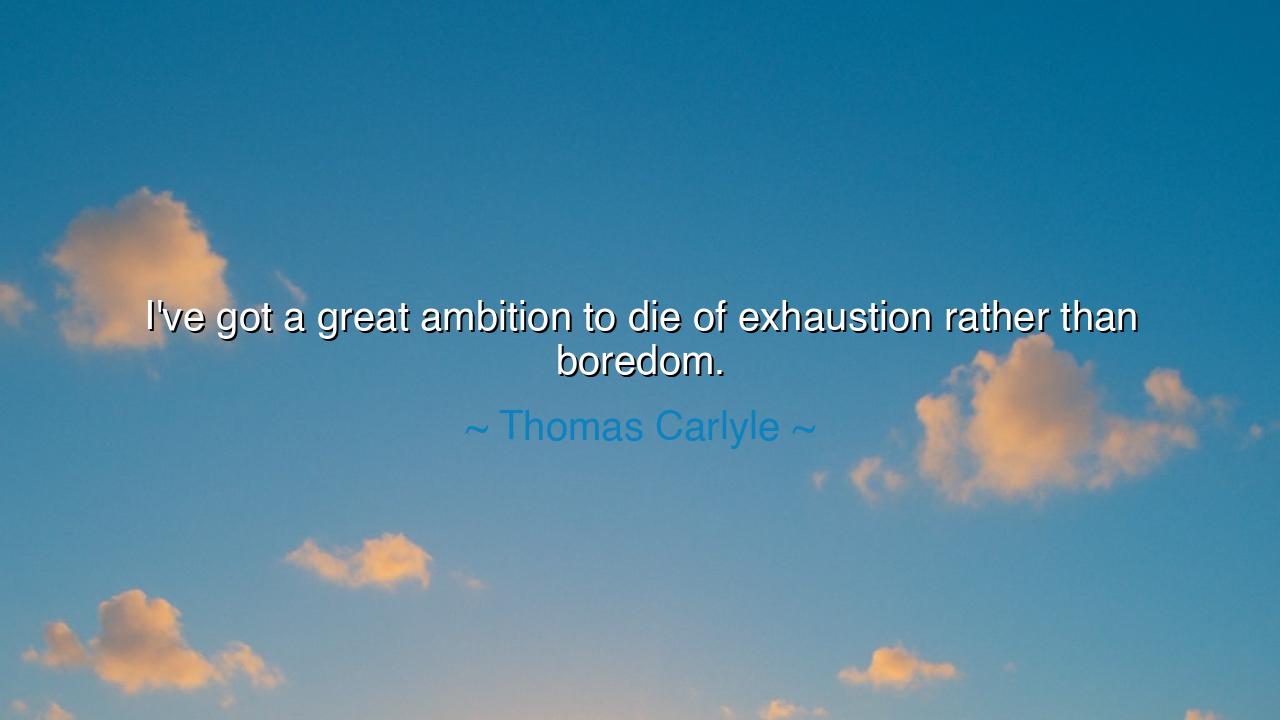
I've got a great ambition to die of exhaustion rather than






"I've got a great ambition to die of exhaustion rather than boredom." — Thomas Carlyle
These fiery words, spoken by Thomas Carlyle, strike like a spark into the soul of all who dream of a life fully lived. In this single line, he declares a creed of motion, purpose, and passion—a vow to burn brightly rather than fade quietly. To die of exhaustion rather than boredom is to choose the path of labor, of creation, of constant striving toward meaning. It is to say, “Let me wear myself out in pursuit of greatness, rather than waste away in idleness.” Such is the song of the worker, the thinker, the artist, the builder of worlds. It is not the song of comfort, but of ambition—and of the immortal fire that dwells in every heart that refuses to sleep through its own existence.
Carlyle, the Scottish philosopher and writer of the nineteenth century, lived in an age of industry and transformation. He saw the world awakening from its slumber, and he despised the creeping disease of complacency. In his eyes, the true curse was not poverty but boredom—that dull spirit that drains the will and numbs the heart. He believed that to labor with intensity, to exhaust oneself in pursuit of truth or virtue or art, was the very essence of a noble life. Better, he said, to collapse upon the field of effort than to sit untouched by the struggle. His words were a challenge to the weak and the weary: rise, act, strive—let no day pass without motion toward your purpose.
For boredom is not merely the absence of work; it is the death of the spirit while the body still lives. It is the slow decay of potential, the quiet surrender to mediocrity. Those who fear effort, who cling to comfort and ease, grow hollow within. But those who embrace exhaustion—who pour every ounce of themselves into their craft, their calling, their dream—these live as the gods of old, burning with divine energy. The great souls of history were not idle; they were aflame. Leonardo da Vinci, Beethoven, Marie Curie—all labored until the end, not because they were forced to, but because they could not bear the silence of stagnation.
Think of Nikola Tesla, the sleepless visionary who toiled in his laboratory long after midnight, consumed by the pursuit of invention. His body grew frail, but his mind blazed like lightning. He knew no rest because his imagination gave him none. Though the world often misunderstood him, he lived by Carlyle’s creed: better to perish in passion than to rot in peace. His exhaustion was not failure—it was the sign of a life lived in pursuit of wonder. Such men and women remind us that fatigue, when earned through purpose, is sacred. It is the body’s price for the soul’s fulfillment.
To die of exhaustion is not to court ruin, but to give oneself wholly to the moment, to the mission. It is to pour one’s energy into something larger than oneself—to write, to build, to teach, to heal, to love with fierce devotion. The world remembers not the idle observer, but the one who labored, who dared, who kept walking long after comfort called them home. Greatness is not born in stillness but in motion—in the endless reaching toward what is just beyond the grasp. The hands that are blistered with effort are far more beautiful than those that remain untouched.
Yet Carlyle’s wisdom holds another truth: that boredom is the symptom of a life without meaning. To escape it, one must not merely fill the hours, but fill them with purpose. Work without love is drudgery; work with love is divine. Exhaustion that comes from the heart’s calling is sweet—it renews even as it consumes. The soul that lives passionately may grow weary, but never empty. The one who lives without purpose may rest, but never truly live. Thus, the choice lies before every soul: to burn or to rust, to strive or to sleep, to die exhausted or to die unfulfilled.
So, my child of tomorrow, take this teaching as your compass: choose the fire, not the fog. Pour your strength into what stirs your spirit. Rise each day with a purpose, however small, and chase it with all the breath you have. Do not fear exhaustion—it is the proof that you have lived. Let your body tire, let your hands ache, but never let your heart grow cold. For as Thomas Carlyle taught, the noblest death is not in stillness but in striving—to die of exhaustion rather than boredom is to die as the living do: aflame, alive, and eternal.






AAdministratorAdministrator
Welcome, honored guests. Please leave a comment, we will respond soon